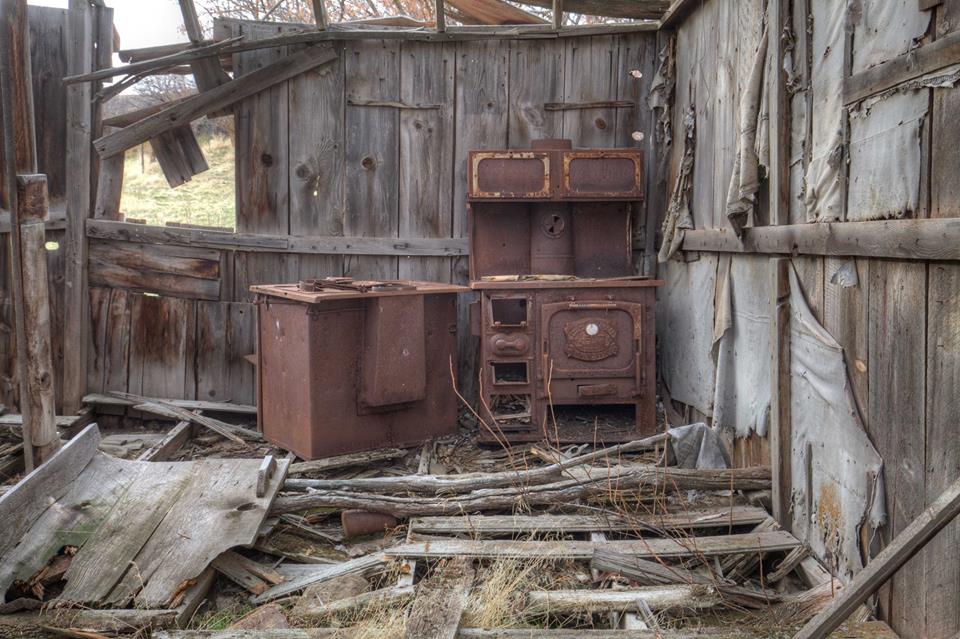Old Stoves and New Life
Reflecting on a Photograph by Thomas Oord
Perhaps there’s always a little something sad about the decay side of life: the side which passes away, never to return in its subjective immediacy (Whitehead). Those of us who celebrate “embodiment” – and it’s quite fashionable in the anti-platonic spirit of contemporary times – best remember that part of being embodied is to partake of the decay side. We need not pretend that all death is good, even though some may be beautiful. A life well-lived must come to grips with impermanence (Buddhism). We are all stoves.
Sunset
Imagine that there is “a unifying source of life and connection that links the whole universe and everything that is in the universe” (Artson). Let “God” be one of its names and, along with Rabbi Bradley Artson, think of this source on the analogy of a sunset:
Like a glorious sunset, it can be experienced even without being understood. We are often able to experience a relationship with something/someone we cannot completely describe. If that is true, and I believe that it is, then our descriptions of what we call God is always more than our description, and always also beyond our description. [1]
Recognize as well that the source can be imagined as a force, or a person, or both.
And it should not be a surprise, in a universe that emerges as forces (gravity, the tides, etc.), and as minds (octopi, bees, birds, people) that we would yearn to apply both descriptors to the source of all. [1]
Use whatever metaphors you need to help orient your mind and heart to the source. And use lots of them.
When we encounter something that cannot be contained in our verbal descriptions or mental compartments, the best approach is to multiply incomplete metaphors, each illuminating one aspect of a totality beyond our grasp. In Jewish tradition, God is described as “monarch,” “shepherd,” “fountain of life,” “life of the universe,” “parent,” “artist,” and many other terms that combine to help us create an emotional silhouette of this cosmic mind, this oneness, this source of creativity and goodness.
Don't let anybody tell you there's only one metaphor for God.
Can and Can't
Can this source reverse the decay side of life? Can it un-happen what has happened? Can it eliminate our need, as human beings, to make peace with impermanence?
Thomas Oord has written a book called God Can’t in which he talks about the things God can’t do. Tom has in mind the many evils that God cannot prevent, even as God is doing all that God can do. I've done a review of his book: Leaning out for Love.
I’m with Tom. Some people believe in a God who has the power to manipulate the world for good, but chooses not to use such powers. Along with Tom and his mentor, John Cobb, I believe in a God who is doing all that God can do, all the time, for the sake of what is good and true and beautiful. God is like the sunset -- very, very beautiful -- everywhere at once -- doing all that it can do, but without leaving behind unused powers.
Old but New
So how might this God of boundless yet uncontrolling love help us deal with the decay side of life. Here I find wisdom in Oord's photograph offered above: the old stove. It symbolizes for me, not only the reality if impermanence which is part of each and every embodies being, but also what the philosopher Whitehead calls the objective immortality of the past.
The objective immortality of the past is the palpable presence of what is old; both revealing and concealing its history (Martin Heidegger); and revealing something of its own energy, its own aliveness (AN Whitehead) along the way. The past is not merely dead; it is also living in a new way, devoid of the immediacy it once had, but energetic nevertheless. Thus can become, for us, a source of wonder. The stove is not simply an object in the world, reducible to mere data. It is what Whitehead calls a lure for feeling: a proposition. It, too, belongs to the Republic of Stories.
Our task is to listen, wonder, and remind ourselves, perpetually, that the universe is not a collection of objects but rather a communion of subjects (Thomas Berry) enfolded within the Deep Remembering. God is the living repository for all the stories and for those who tell them. They are cared for, in Whitehead's words, with "a tender care that nothing be lost."
Old stoves are among the best of storytellers, both in what they reveal and what they conceal. We can quietly in their presence.
And we can also wonder, perhaps hope, that their stories are retained in an even more complete way in the ongoing love of the "unifying source of life and connection that links the whole universe and everything that is in the universe."
Whitehead speaks of this ongoing love as the consequent nature of God. It is that side of God in which all things are present as part of God's body. God's body is the universe itself as enfolded into God's life. Imagine that as we see the sunset we are simultaneously included in its beauty. We partake of it, even without our understanding how this occurs.
We really do not know that the stove looks like in God's memory, or what we look like either. But we can have faith that no stories are lost, and that all are part of larger vision belonging to the Sunset. All partake of new life in God even amid, and perhaps even because of, the decay. Does this mean that we old stoves -- and our loved ones -- enjoy a continuing journey after death. Many process theologians believe so; and I am among them. But my faith is in the Sunset and its transformative power. That's enough and, truth be told, plenty.
-- Jay McDaniel
Sunset
Imagine that there is “a unifying source of life and connection that links the whole universe and everything that is in the universe” (Artson). Let “God” be one of its names and, along with Rabbi Bradley Artson, think of this source on the analogy of a sunset:
Like a glorious sunset, it can be experienced even without being understood. We are often able to experience a relationship with something/someone we cannot completely describe. If that is true, and I believe that it is, then our descriptions of what we call God is always more than our description, and always also beyond our description. [1]
Recognize as well that the source can be imagined as a force, or a person, or both.
And it should not be a surprise, in a universe that emerges as forces (gravity, the tides, etc.), and as minds (octopi, bees, birds, people) that we would yearn to apply both descriptors to the source of all. [1]
Use whatever metaphors you need to help orient your mind and heart to the source. And use lots of them.
When we encounter something that cannot be contained in our verbal descriptions or mental compartments, the best approach is to multiply incomplete metaphors, each illuminating one aspect of a totality beyond our grasp. In Jewish tradition, God is described as “monarch,” “shepherd,” “fountain of life,” “life of the universe,” “parent,” “artist,” and many other terms that combine to help us create an emotional silhouette of this cosmic mind, this oneness, this source of creativity and goodness.
Don't let anybody tell you there's only one metaphor for God.
Can and Can't
Can this source reverse the decay side of life? Can it un-happen what has happened? Can it eliminate our need, as human beings, to make peace with impermanence?
Thomas Oord has written a book called God Can’t in which he talks about the things God can’t do. Tom has in mind the many evils that God cannot prevent, even as God is doing all that God can do. I've done a review of his book: Leaning out for Love.
I’m with Tom. Some people believe in a God who has the power to manipulate the world for good, but chooses not to use such powers. Along with Tom and his mentor, John Cobb, I believe in a God who is doing all that God can do, all the time, for the sake of what is good and true and beautiful. God is like the sunset -- very, very beautiful -- everywhere at once -- doing all that it can do, but without leaving behind unused powers.
Old but New
So how might this God of boundless yet uncontrolling love help us deal with the decay side of life. Here I find wisdom in Oord's photograph offered above: the old stove. It symbolizes for me, not only the reality if impermanence which is part of each and every embodies being, but also what the philosopher Whitehead calls the objective immortality of the past.
The objective immortality of the past is the palpable presence of what is old; both revealing and concealing its history (Martin Heidegger); and revealing something of its own energy, its own aliveness (AN Whitehead) along the way. The past is not merely dead; it is also living in a new way, devoid of the immediacy it once had, but energetic nevertheless. Thus can become, for us, a source of wonder. The stove is not simply an object in the world, reducible to mere data. It is what Whitehead calls a lure for feeling: a proposition. It, too, belongs to the Republic of Stories.
Our task is to listen, wonder, and remind ourselves, perpetually, that the universe is not a collection of objects but rather a communion of subjects (Thomas Berry) enfolded within the Deep Remembering. God is the living repository for all the stories and for those who tell them. They are cared for, in Whitehead's words, with "a tender care that nothing be lost."
Old stoves are among the best of storytellers, both in what they reveal and what they conceal. We can quietly in their presence.
And we can also wonder, perhaps hope, that their stories are retained in an even more complete way in the ongoing love of the "unifying source of life and connection that links the whole universe and everything that is in the universe."
Whitehead speaks of this ongoing love as the consequent nature of God. It is that side of God in which all things are present as part of God's body. God's body is the universe itself as enfolded into God's life. Imagine that as we see the sunset we are simultaneously included in its beauty. We partake of it, even without our understanding how this occurs.
We really do not know that the stove looks like in God's memory, or what we look like either. But we can have faith that no stories are lost, and that all are part of larger vision belonging to the Sunset. All partake of new life in God even amid, and perhaps even because of, the decay. Does this mean that we old stoves -- and our loved ones -- enjoy a continuing journey after death. Many process theologians believe so; and I am among them. But my faith is in the Sunset and its transformative power. That's enough and, truth be told, plenty.
-- Jay McDaniel




